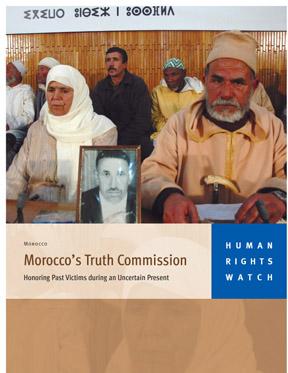Reports
“They’ll Get You No Matter What”
Morocco’s Playbook to Crush Dissent
In the 129-page report, “They’ll Get You No Matter What: Morocco’s Playbook to Crush Dissent,” Human Rights Watch documents a range of tactics that, when used together, form an ecosystem of repression, aiming not only to muzzle dissenting voices but to scare off all potential critics. The tactics include unfair trials and long prison terms for nonspeech criminal charges, harassment and smear campaigns in state-aligned media, and targeting dissidents’ relatives. Critics of the state were also subjected to video and digital surveillance, and in some cases to physical intimidation and assault that the police failed to investigate properly.

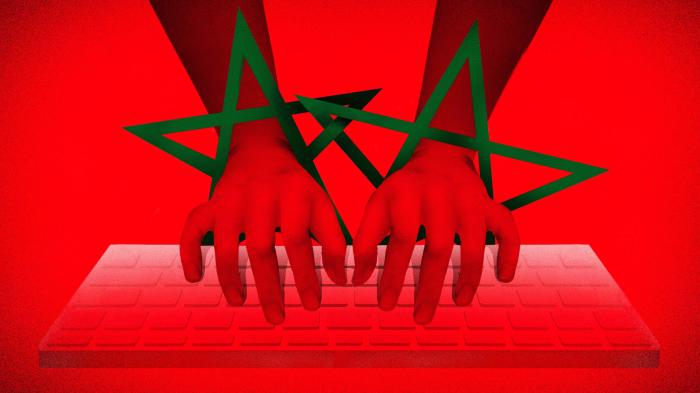
-
May 4, 2017
The Red Lines Stay Red
Morocco's Reforms of its Speech LawsThis report compares the new laws with those they replaced, and urges Morocco’s recently formed government and the parliament elected in October 2016 to adopt legislation decriminalizing all nonviolent speech offenses. Restrictions under the country’s penal code undercut the positive features of the new laws, Human Rights Watch said. Notably, the revised penal code maintains prison as punishment for speech that harms the monarchy, the person of the king, Islam, and Morocco’s “territorial integrity” – the “red lines” that limit critical discussion of some of the key issues in the kingdom.
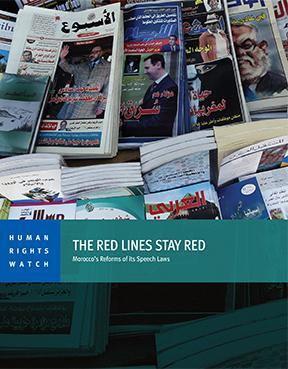
-
February 4, 2016
“Pain Tears Me Apart”
Challenges and Progress in Ensuring the Right to Palliative Care in MoroccoThis report estimates that each year, more than 62,000 Moroccans need palliative care, which focuses on improving the quality of life of people with life-limiting illnesses by treating pain and other symptoms. While the Moroccan government has taken a number of important steps to improve end-of-life care, Human Rights Watch found only two public hospitals, in Casablanca and Rabat, have specific units that offer this essential health service, and only to cancer patients. Patients suffering severe pain outside of these cities must either undergo difficult travel to these centers or do without effective pain medicine.
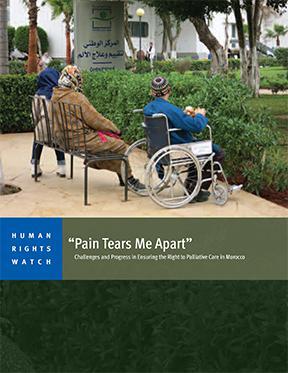
-
February 10, 2014
Abused and Expelled
Ill-Treatment of Sub-Saharan African Migrants in MoroccoThis 79-page report found that beatings and other abuses occurred as Moroccan security forces took custody of Sub-Saharan migrants who had tried unsuccessfully to reach the Spanish enclave of Melilla, or—prior to September 2013—as they were rounding up migrants without any semblance of due process to expel them to Algeria.
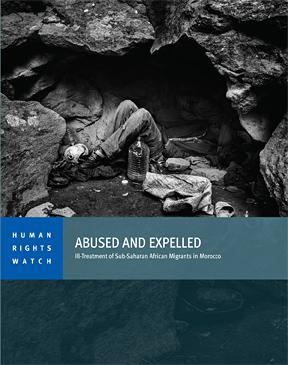
-
June 21, 2013
“Just Sign Here”
Unfair Trials Based on Confessions to the Police in MoroccoThis 100-page report examined five trials between 2009 and 2013 of a total of 77 people – including protesters seeking reform, Western Sahara activists, and persons accused of plotting terrorism.
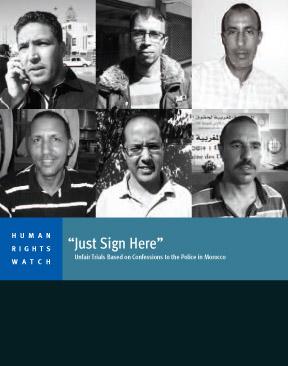
-
November 15, 2012
Lonely Servitude
Child Domestic Labor in MoroccoThis 73-page report found that some child domestic workers – who are overwhelmingly girls – toil for 12 hours a day, 7 days a week, for as little as US$11 a month. Some girls told Human Rights Watch that their employers frequently beat and verbally abused them, denied them education, and sometimes refused them adequate food.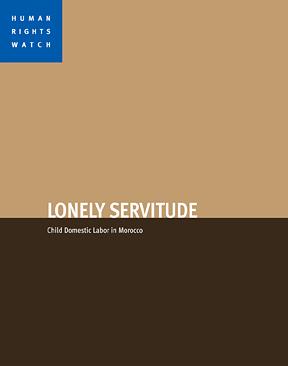
-
October 25, 2010
Morocco: “Stop Looking for Your Son”
Illegal Detentions under the Counterterrorism LawThis report documents a pattern of abuse under Morocco's counterterrorism law, which was adopted 12 days after coordinated suicide bombings in Casablanca on May 16, 2003, took 45 lives. Many of these abuses violate the progressive legislation Morocco adopted to safeguard against torture and illegal detention, as well as international conventions that Morocco has signed.
-
October 7, 2009
Freedom to Create Associations
A Declarative Regime in Name OnlyThis 45-page report says that local representatives of the Interior Ministry often refuse to accept registration papers when a group's objectives or membership displeases the authorities. Moroccan law permits new associations to come into being simply by registering with local authorities, rather than by requiring prior authorization. The law obliges officials to accept the registration papers.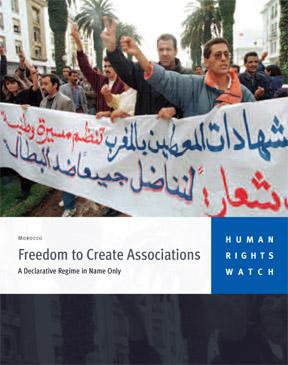
-
December 19, 2008
Human Rights in Western Sahara and in the Tindouf Refugee Camps
This 216-page report focuses on the present-day situation rather than on past abuses. Human Rights Watch documents how Morocco uses a combination of repressive laws, police violence, and unfair trials to punish Sahrawis who advocate peacefully in favor of independence or full self-determination for the disputed Western Sahara.

-
October 17, 2008
Returns at Any Cost
Spain’s Push to Repatriate Unaccompanied Children in the Absence of SafeguardsThis 22-page report says that in Andalusia, the southern region that is a common entry point for migrants, authorities have said they intend to send up to 1,000 unaccompanied children in their custody to Morocco, claiming that safeguards are in place. But officials could not explain how they determined it was in a child’s best interest to return, as required by law.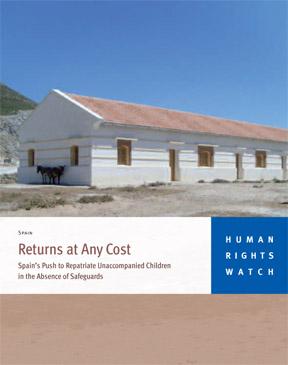
-
July 26, 2007
Unwelcome Responsibilities
Spain’s Failure to Protect the Rights of Unaccompanied Migrant Children in the Canary IslandsThis 115-page report documents how children stay in emergency centers for indefinite periods, in often overcrowded and poor conditions. The children told Human Rights Watch that they have been subjected to beatings by staff, and left unprotected from violence by their peers.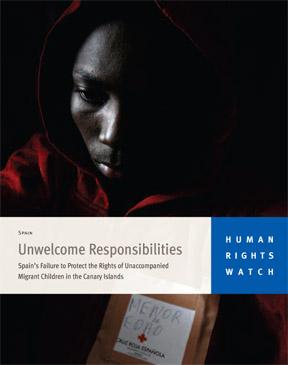
-
June 7, 2007
Off the Record
U.S. Responsibility for Enforced Disappearances in the “War on Terror”This 21-page briefing paper, published by six leading human rights organizations, includes the names and details of 39 people who are believed to have been held in secret US custody abroad and whose current whereabouts remain unknown. The briefing paper also names relatives of suspects who were themselves arrested and detained, including children as young as seven. -
July 27, 2006
Swept Under the Rug
Abuses against Domestic Workers Around the WorldThis 93-page report synthesizes Human Rights Watch research since 2001 on abuses against women and child domestic workers originating from or working in El Salvador, Guatemala, Indonesia, Malaysia, Morocco, the Philippines, Saudi Arabia, Singapore, Sri Lanka, Togo, the United Arab Emirates, and the United States.

-
May 8, 2006
Morocco: Prosecution of Independent Newsweeklies
A series of prosecutions of independent weeklies, the most outspoken and critical sector of the Moroccan news media, show the continuing limits on press freedom in that country. -
December 19, 2005
Inside the Home, Outside the Law
Abuse of Child Domestic Workers in MoroccoThis 60-page report documents cases of girls as young as five working 100 or more hours per week, without rest breaks or days off, for as little as six and a half Moroccan dirhams (about 70 U.S. cents) a day.
-
November 27, 2005
Morocco's Truth Commission
Honoring Past Victims during an Uncertain PresentThis 48-page report discusses how after nearly two years of investigations into abuses committed between 1956 and 1999, the state-appointed Equity and Reconciliation Commission (ERC) is to submit its final report and recommendations to King Mohamed VI at the end of this month.